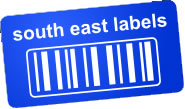The barcode was born from an alliance between manufacturers and retailers. South East Labels, a leading supplier of labelling services and systems, today commented that barcodes are increasingly being used by consumers to further their own ends. It seems that the data contained in a barcode is no longer just owned by the unholy alliance of those who make and those who sell. So, exactly what are those who buy using barcodes for?

When the barcode was patented in America in 1949 retailers and manufacturers had to wait for computer science to catch up before its full potential could be realised. At its heart it is not the barcode per se that does the work but the data that can be attached to it. With such data a simple barcode scan can help track, pick and deliver stock. Once in store this stock can be counted, monitored and automatically re-ordered. Using this data checkout waiting time can be reduced – helping goods sell quicker and getting more paying customers out the door. Furthermore a barcode’s data facilitates the smooth operation of complex and varied price promotions throughout the store.
According to South East Labels, however, the barcode may be striking back. It appears it is no longer serving as the hand-maiden for the efficient supply and sale of goods. Recent events suggest the barcode may also now be a tool for consumers to use, and in ways that may not be how the manufacturers and retailers ever dreamt of.
Stroll down a supermarket aisle. Stop at the soup – keep going past the dried stuff till you reach the tins. Locate a well-known variety of Tomato Soup. Now find the 300g tin. The barcode on this if scanned by a mobile device has provided thousands of music fans with a free mixtape from The Streets’ Mike Skinner. That will be without the manufacturer’s permission. Perhaps not since Warhol appropriated the image of a can of soup as an artwork has pop culture shamelessly plundered soup tins packaging to its own advantage. If this seems too absurd to be true – download the free Mike Scanner app and try for yourself. The barcode seems to have taken on a life of its own beyond its original intentions.
Another example of the barcode being made to strike back is slightly less obscure. Fooducate is an app for mobile devices that reads the barcodes of food packaging. It provides not supermarket cost prices or stock levels however. Instead it aims to cut through the fudged wording and smoke and mirrors that can characterise food packaging. It gives each product a simple to follow health rating and suggests alternatives if you find your health snack is actually a health hazard.
The barcode, it seems, strikes back – the rich data it enables are increasingly being used by consumers as well as by retailers and manufacturers. This merely serves to underline the on-going importance of the barcode. A spokesperson for South East Labels commented that “it’s interesting to see the uses that are being made of barcodes. We have been providing labelling services, software and products since 1988. If your business needs security labels, printed labels or barcodes we can help ensure they are provided in a timely manner. We can’t, however, stop Mr Skinner from attaching a download to a scan of them.â€
Via EPR Network
More Computer press releases

